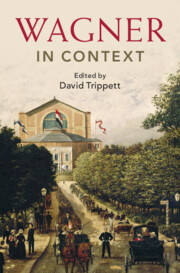Book contents
- Wagner in Context
- Composers in Context
- Wagner in Context
- Copyright page
- Contents
- Illustrations
- Musical Examples
- Contributors
- Acknowledgements
- Abbreviations
- Introduction
- I Place
- II People
- III Politics, Ideas, and Bodies
- IV Life, Language, and the Ancient World
- Chapter 23 Wagner’s Finances
- Chapter 24 Wagner’s Apprenticeship
- Chapter 25 Wagner’s Mendacious Humanism: Wagnerian Rhetoric between Nature and the Human
- Chapter 26 Declaiming Wagner: Between Genesis and Historical Performance Practice
- Chapter 27 The German Study of India and Buddhism
- Chapter 28 Greek Drama in Its Nineteenth-Century Reception
- V Music and Performance
- VI Reception
- Further Reading
- Select Bibliography
- Index
Chapter 26 - Declaiming Wagner: Between Genesis and Historical Performance Practice
from IV - Life, Language, and the Ancient World
Published online by Cambridge University Press: 14 March 2024
- Wagner in Context
- Composers in Context
- Wagner in Context
- Copyright page
- Contents
- Illustrations
- Musical Examples
- Contributors
- Acknowledgements
- Abbreviations
- Introduction
- I Place
- II People
- III Politics, Ideas, and Bodies
- IV Life, Language, and the Ancient World
- Chapter 23 Wagner’s Finances
- Chapter 24 Wagner’s Apprenticeship
- Chapter 25 Wagner’s Mendacious Humanism: Wagnerian Rhetoric between Nature and the Human
- Chapter 26 Declaiming Wagner: Between Genesis and Historical Performance Practice
- Chapter 27 The German Study of India and Buddhism
- Chapter 28 Greek Drama in Its Nineteenth-Century Reception
- V Music and Performance
- VI Reception
- Further Reading
- Select Bibliography
- Index
Summary
Richard Wagner’s music and the way he created it are closely interconnected to the vocal delivery of the actors and singers of his childhood and youth. Or to put it more precisely: during the time of his socialisation in early nineteenth-century Saxony, there was practically no difference between the profession of an actor and a dramatic singer. The same people performed in spoken drama and music theatre what led to a declamatory style of singing that was typical for German music theatre. This style shaped Wagner’s Sprechgesang, both considering its structure and its genesis. He did as a composer what the dramatic actors of his time whose performances shifted between singing and speech did on stage: he developed his vocal lines out of declamation and created different degrees of more or less speech-like passages. The latter poses a challenge for the historically informed performance practice of his works.
Keywords
- Type
- Chapter
- Information
- Wagner in Context , pp. 258 - 266Publisher: Cambridge University PressPrint publication year: 2024

